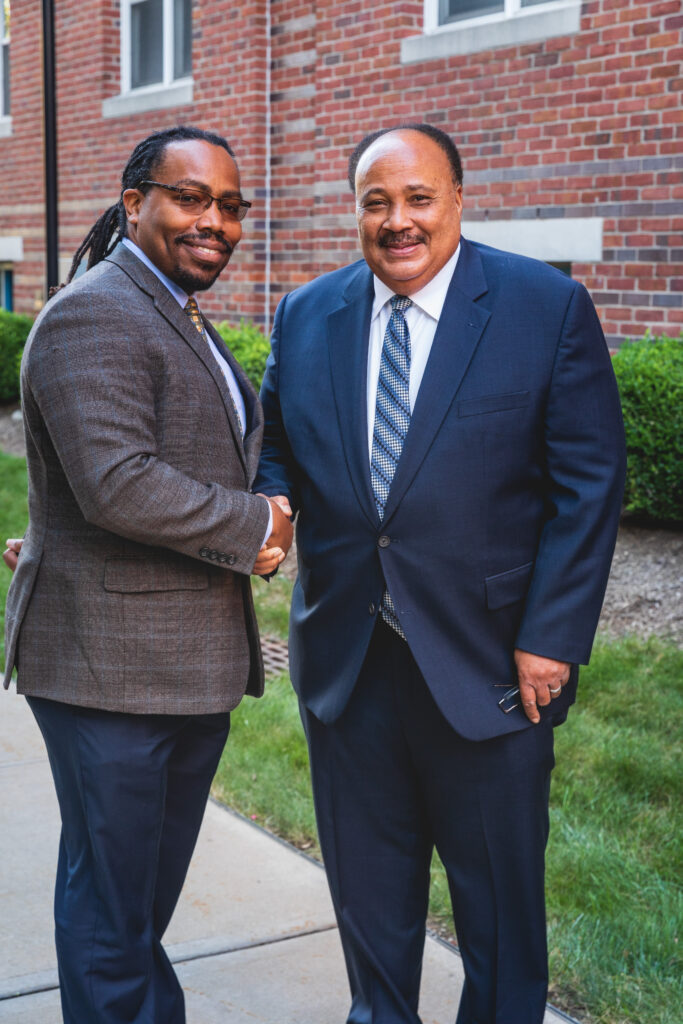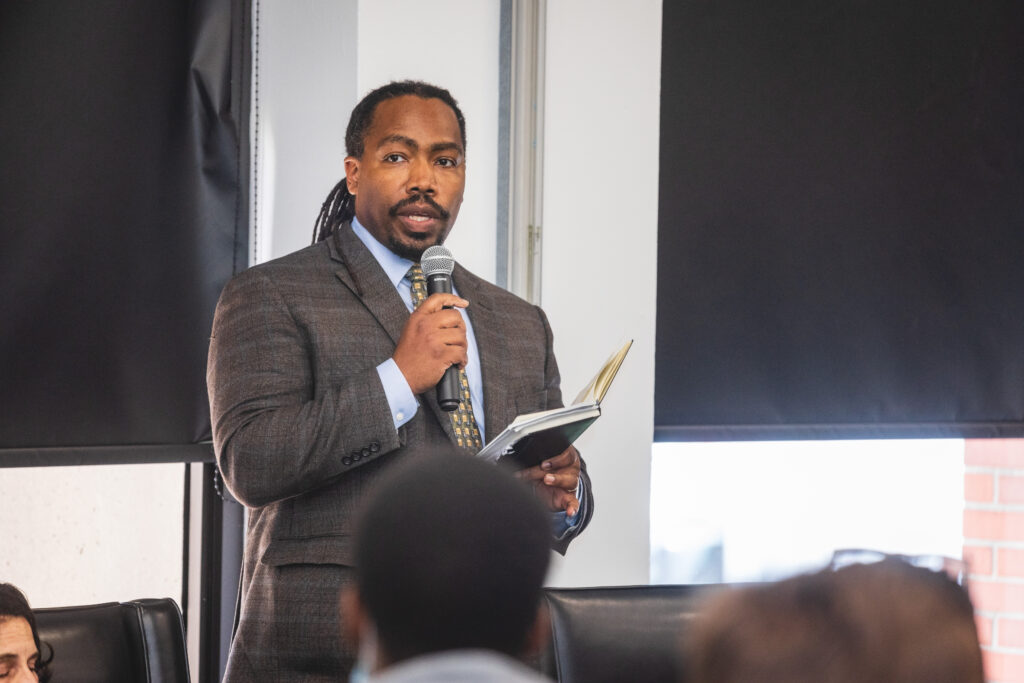When it comes to Black history, Saint Peter’s University and members of Jersey City’s African American community are partnering to document it.
John Johnson, Jr., Ph.D., assistant professor of history at Saint Peter’s University, is leading the charge with a public history project titled “Living for the City,” which is designed to examine the rich history of the African American community in Jersey City.
Prior to joining the faculty at Saint Peter’s, Dr. Johnson served as the executive director of Newark Celebration 350, a yearlong celebration of Newark, New Jersey’s founding. His work in Newark inspired him to conduct this similar project in Jersey City. The project is also aimed to give context to the two visits of Rev. Dr. Martin Luther King Jr. H ’65 to Jersey City in the late 1960s. One of the visits was to Saint Peter’s and the second was to the Metropolitan AME Zion Church.
The project has become a reality with the support of a Humanities Research for the Public Good grant from the Council of Independent Colleges (CIC).Many aspects of the project are being carried out by Saint Peter’s students under the guidance of Dr. Johnson and other members of the Saint Peter’s faculty and administration including Michael DeGruccio, Ph.D., associate professor of history, and University Archivist Mary Kinahan-Ockay.
“The CIC’s grant was created to increase student interest and participation in the humanities and the receipt of the grant is making that feasible at Saint Peter’s,” said Dr. Johnson.
Overall, the project will explore the African American experience in the North beginning with the Great Migration in the 1930s, connecting with the Civil Rights Movement and uprisings of the 1960s, and concluding with the history of Black urban space as it came to be in the 1970s.It will be conducted in a three step process, which includes an archival research phase, an oral history phase and a documentary- development phase.
In partnership with Metropolitan AME Zion Church and the Jersey City Office of Cultural Affairs, students are currently conducting the archival research using The Hon. Frank J. Guarini Center for Community Memory, The Saint Peter’s University Archives, Rare Books and Special Collections and using other local archives.
For the oral history phase, students will interview people in the local African American community who arrived or whose families arrived in the Great Migration and who lived through the uprisings of the 1960s. The participants are largely members of the Metropolitan AME Zion Church and the Monumental Baptist Church in Jersey City. They will explore questions regarding the migration experience and memories of the 1964 uprising. Many of these residents attended both of Dr. King’s speeches and have not yet documented their experiences.

Johnson (left) with Martin Luther King III H ’21 (right) at Saint Peter’s 2021 Michaelmas Convocation.
The documentary will explore the history of Jersey City’s African American community and the record of Black Freedom Movement speakers at Saint Peter’s and Metro AME Zion Church. It will serve as an essential part of the public history during this era of the community.
The need for this documentation became more apparent than ever when Martin Luther King III H ’21, the son of the late Rev. Dr. Martin Luther King Jr. H ’65 and Coretta Scott King, came to Saint Peter’s in September to provide the keynote address for the 2021 Saint Peter’s Michaelmas Convocation. While there were articles about Dr. King’s visit in 1965 and Coretta Scott King’s visit in 1975, there were no audio or visual recordings of either event.
“We wanted to be sure to archive the details of the visit of Martin Luther King III to preserve this interesting history of the King family and Saint Peter’s,” said Dr. Johnson. “The visits of Rev. Dr. Martin Luther King Jr. H ’65, Coretta Scott King and Martin Luther King III H ’21 are such a significant part of our history, which truly speaks to the uniqueness of Saint Peter’s.”
The archival work on the project thus far has already revealed some interesting intersections in the history of Jersey City’s religious communities. For example, the Monumental Baptist Church was, in fact, a Catholic school before it became a house of worship for the Protestant community. The researchers learned that many of the Protestants who were members of the Church actually attended the Catholic school.
“In the current political and social climate, we often imagine our histories to be extremely polarized, when in fact, our research is unveiling the overlaps and intersections of how interconnected our history actually is,” said Dr. Johnson.
The project is also revealing some interesting aspects of how Saint Peter’s Jesuit traditions played an important role in the City’s African American history. The students are currently learning about Project 25, a program which began in 1968 through a partnership between then Saint Peter’s President Rev. Victor Yanitelli, S.J. and the head of the Monumental Baptist Church. The program offered enrichment programs for high school juniors and seniors from underserved schools to prepare them for a college courses at Saint Peter’s.
“Project 25 is just one of the many examples of how Saint Peter’s has lived out the Jesuit traditions of cura personalis and of people for and with others,” said Dr. Johnson. “We are grateful for the opportunity to explore and learn more about the institution’s role in the rich history of the African American community of Jersey City.”

